
New scientific findings suggest young blood serum could rejuvenate aging skin cells, but only when mediated by bone marrow, offering a potential breakthrough in anti-aging research.
Story Snapshot
- Young blood serum is shown to reverse aging in skin cells, but only with bone marrow involvement.
- Research identifies 55 proteins, with seven having strong rejuvenating effects.
- Findings could lead to new anti-aging therapies targeting these proteins.
- Study is preclinical; further research needed to confirm human efficacy and safety.
Research Breakthrough: Young Blood and Bone Marrow
Researchers at Beiersdorf AG have discovered that young human blood serum can reverse aging effects in skin cells, but only when bone marrow cells are present. This significant breakthrough was achieved using a 3D organ-on-a-chip system, which showed that young blood serum stimulates bone marrow cells to secrete proteins that rejuvenate skin. This process increases cell proliferation, reduces biological age, and improves mitochondrial function, marking a potential new frontier in anti-aging interventions.
HMM: Scientists Identify How Young Blood Reverses Aging in Human Skin Cells. “It appears that the https://t.co/ujRRDbGouf
— Soph (@sophiatseliem) August 16, 2025
The study, published in the journal “Aging” in July 2025, identifies 55 candidate proteins responsible for these effects, with seven proteins exhibiting particularly strong rejuvenating properties. This research is the first to provide direct evidence at the cellular level in humans, bridging the gap between prior animal research and potential human applications. The findings have generated significant interest in the scientific community, sparking discussions on how these proteins can be harnessed for pharmaceutical or cosmetic products.
Watch: Young Blood: The Secret to Youthful Skin?
Historical Context and Industry Implications
The idea of using young blood to rejuvenate aging tissues dates back to 19th-century parabiosis experiments and gained traction with 2000s mouse studies. Despite promising results in animals, human applications have been limited due to ethical and technical challenges. With advancements in 3D tissue culture, researchers can now explore these effects in controlled human cell experiments. The anti-aging industry, projected to reach $381.2 billion by 2032, stands to benefit greatly from these findings, as they may lead to the development of targeted protein therapies.
While promising, the research remains preclinical. The proteins identified are candidates for future drug or cosmetic development, but rigorous clinical trials are necessary to establish their efficacy and safety in humans. Beiersdorf AG, known for brands like NIVEA and Eucerin, is poised to leverage these findings for potential new classes of topical anti-aging ingredients, emphasizing the need for further studies to refine and validate these discoveries.
Sources:
Sustainability Times
ScienceAlert
Aging (journal)
Aging (news release)
New Atlas


















